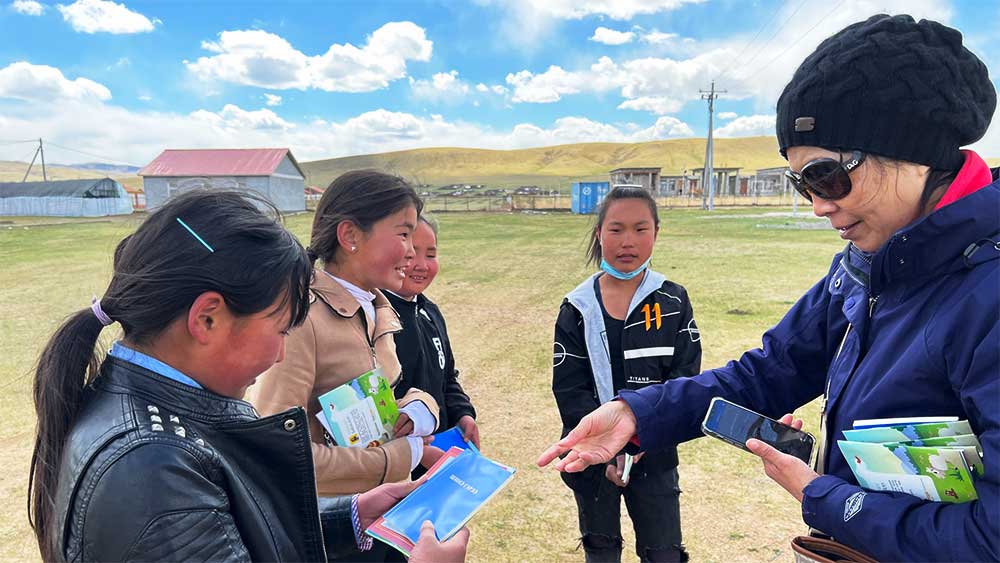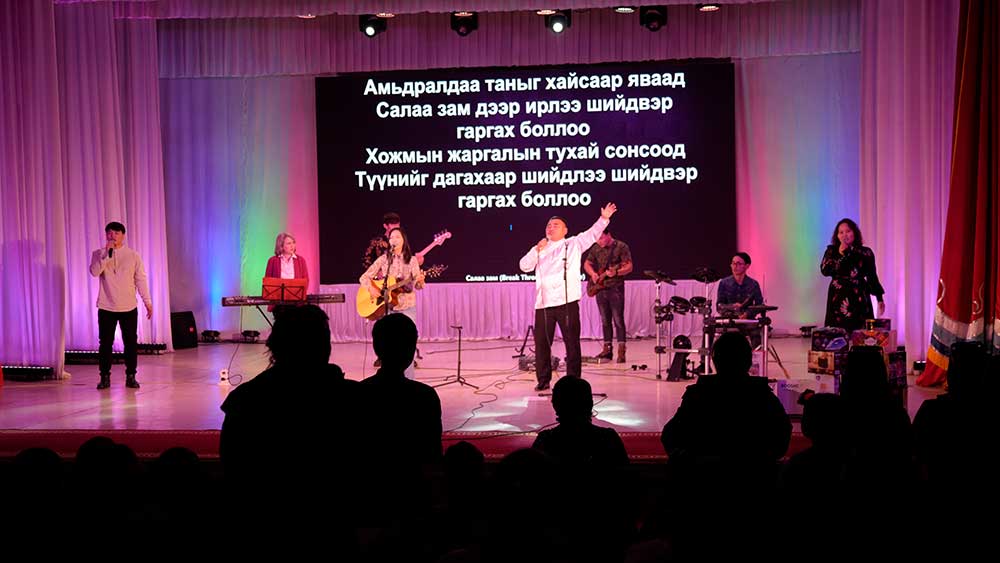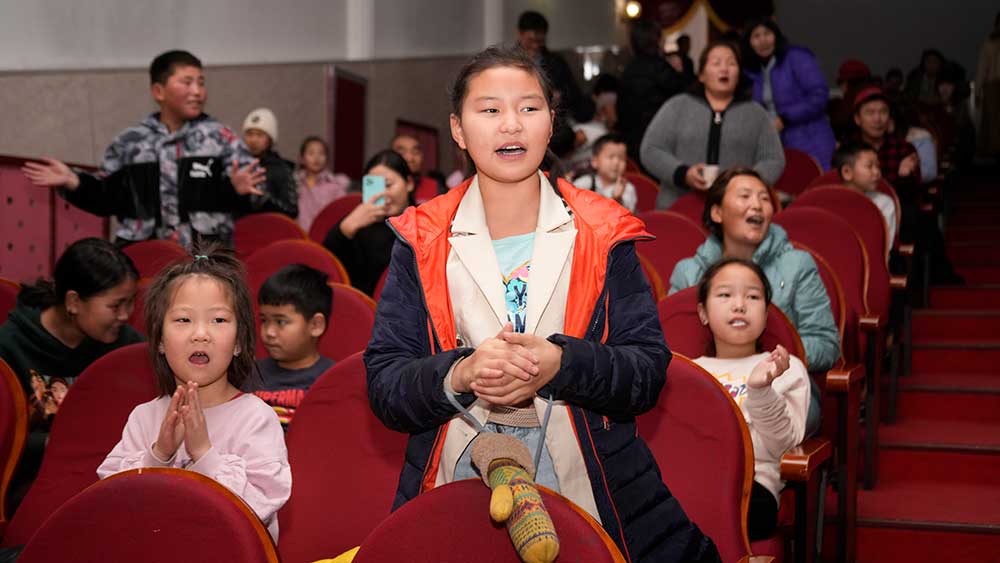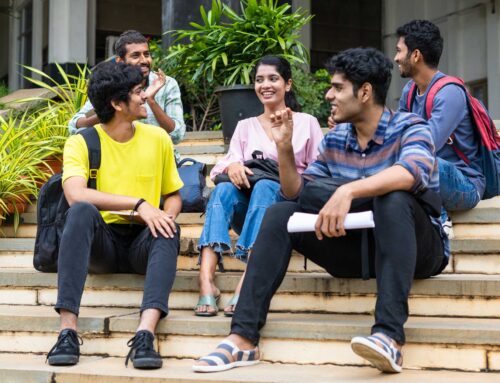The Shepherd With The Threadbare Bible
Dry grassy plains stretch out for miles under a brilliant blue sky. The treeless horizon whispers of mountains rising in the distance, yet here, in the middle of the plateau, it’s almost as if the flat Earth stretches on endlessly. It would be easy to presume that this stark landscape is uninhabited, but with one-quarter of Mongolia’s population living as nomads, you would be mistaken.
It was precisely here where a Haggai team came across a shepherd living in his ger — the traditional dwelling of Mongolia’s nomadic people, constructed to be disassembled and transported. He had in his possession a threadbare Bible, bleached by the sun and tossed by the elements. It was a prized possession given to him by missionaries visiting the area when the country first opened up after communism. This wandering shepherd had a hunger for the Word of God and a desire for all his countrymen to know this Jesus who had tended to his heart. God would use this Divine meeting to lead Haggai leaders toward our flourishing pilot project in Mongolia.
According to the Center for the Study of Global Christianity, it is estimated that 51% of the Mongolian population lives in Gospel poverty. Half the nation hasn’t had the opportunity to hear and respond to the Gospel, which has the power to transform lives. For this reason, Mongolia was chosen to be the pilot for the Accelerate Ending Gospel Poverty (AEGP) Initiative, a collaboration of ministries created and propelled by Haggai International to bring an end to Gospel poverty in our generation.
Mongolia’s roots are deeply established in Tibetan Buddhism, and only 2% of its population identify as Christians. After an initial surge of Christianity in the 1990s, when the country first received missionaries from South Korea, Europe, and America, growth in Christianity has substantially slowed. Immature leadership, conflict, theological differences, and a lack of long-term vision and planning have been some of the issues experienced by the early Church. Rekindling Christianity in Mongolia posed a challenge, but one that the AEGP Initiative planned to tackle with a highly focused, collaborative, and resourced approach.
The wheels of the pilot were set in motion when Haggai leaders Drs. Amarsaikhan (Amar) Bazar and Zolzaya (Zola) Baljinnyam were elected to implement the AEGP Initiative in Mongolia. One of the key indicators for success would be the collaboration of fragmented ministries across the country, including prison, children’s, and medical ministries. These entities had their own pastors, leaders, or volunteers, but were not connected to each other. For example, prior to the AEGP Initiative, if a prison ministry team planned to go to a western province, a medical team who had previously planned to go to the same province would intentionally choose to go to an eastern province. The idea was not to dilute the other’s work, as if the target population would be divided and impact would drop.

Instead, significant opportunities for collaborative Gospel impact were being missed. Mongolian Christian leaders had been praying for a renewed movement of the Gospel across their country and, after a 12-year hiatus from gathering, the Mongolian Evangelical Alliance (MEA) — representing over 600 churches pivotal to Mongolia’s future — started meeting again. MEA is associated with World Evangelical Alliance, the largest international organization of evangelical churches in the world.
“Prior to this, the MEA had a high turnover rate of leadership with a new head every 1 to 2 years,” Dr. Zola says. “And each new head of MEA developed a new direction, which was canceled by the next appointed one, thus lacking continuity and unity.”
Drs. Amar and Zola were instrumental in this gathering, convincing and connecting Christian brothers and sisters from fragmented Christian organizations who had limited collaboration over the years. They started organizing a monthly meeting, which began with seven people from VetNet, Agape Christian Hospital, World Vision, and YWAM. Gradually, the meeting would include about 20 people, each representing a Christian organization. Each time the meeting would take place at one of those organizations so that others could see what the hosting NGO or entity did.
Before these momentous meetings, Drs. Amar and Zola felt it could only go forward if they began with reconciliation and repentance before the Lord. Together with other leaders, they asked God to forgive their sins of not faithfully living God’s commandments. They prayed that the Lord would bring unity among Christian leaders in working together to advance the Gospel. It seemed to all involved that God was orchestrating a “Divine convergence” to bring about an end to Gospel poverty. Since then, every meeting around the AEGP Initiative — focused on equipping leaders, leading outreaches, and hosting collaborative roundtables with local ministries — has begun with repentance and prayer before God.
Dr. Zola is a public health officer specializing in veterinary health and the laboratory diagnosis of zoonotic diseases (infections spread between people and animals). She obtained her doctorate inSwitzerland. She became a Christian when she heard the Gospel from American missionaries during her veterinary training and has since shared the Gospel with hundreds of veterinarians and students. She says “All people are searching for the meaning of life and spiritual experiences. I share the hope of the Gospel, knowing that only God can fill that void.”
Dr. Amar is a dentist and the vice president of theMongolian National University of Medical Sciences. He has a vision to see “all Mongolians free of sickness and suffering, praising God.” He says, “After years of failed hope in religions and regimes, the people of Mongolia are seeking truth: Jesus is the Way, the Truth, and the Life. Mongolians are also seeking their true identity. Communism eroded our sense of self; we need to find our identity in Christ.”
Together, these two doctors lead the AEGP Initiative. Now they organize travel to the most rural provinces in Mongolia calling on Christian dentists, physical therapists, pediatricians, those in prison ministry, nutritionists, OB-GYNs, rehabilitation therapists, family advisors, Sunday school teachers, leadership trainers, those who distribute Bibles, and more to join them. Sometimes non-Christian doctors voluntarily accompany them because they want to do something good for society. These teams and individuals have even begun to seek each other on their own, choosing to combine their efforts instead of one going to a western province and the other to an eastern. Now, when prison ministry teams join efforts with medical service teams, they have found typically stern prison managers to open their doors enthusiastically because many prisoners have sickness and diseases.

Before setting off with the 40 to 60 people who comprise a team, Dr. Amar will visit the target province three months in advance. He meets the province’s governor and ascertains their needs, proposes a solution based on the team’s field of expertise, and adjusts the plans based on those needs. For instance, in a province that needs assistance caring for young, disabled children, the province governor may ask for dentists trained to work with children who won’t be able to open their mouths on command. In another province, a community might need nutritional and exercise training for expectant mothers in local maternity wards.
Once this meeting takes place, Dr. Zola then begins fine-tuning the plans to serve the province, ensuring the ministries and organizations are equipped and on the same page. When an outreach trip to a province is executed, teams may often stay in a location for a month. This allows for proper medical care or leadership training. Because these efforts have been so successful at meeting both tangible and spiritual needs, governors are actively seeking assistance from the AEGP Initiative where before, Christian efforts were largely disregarded.
The AEGP outreach teams use these new opportunities to share the Gospel with people like Ariunaa, a young girl who lives with her grandfather in a village only accessible by an hourslong drive on a dirt road. Her parents are herders, and she attends the region’s solitary school in her grandfather’s village. She had just graduated seventh grade when Haggai leader Dr. Zola met her, giving her a Bible and telling her about Jesus.
“How can we pray for you?” Dr. Zola asked. Ariunaa opened up, asking for prayer for her dad, an alcoholic, and her mom who had a significant leg injury. Life is hard and lonely for Ariunaa, yet as is typical for Mongolian hospitality, she invited Dr. Zola into her ger where she asked more questions about Jesus. Not long after, she accepted Jesus into her heart.

ministries.
Drs. Amar and Zola represent just two leaders of the hundreds strong Haggai national ministry who are collaborating with strategic organizations on the ground to share the Gospel in effective ways only they — native Mongolians — can do.
A catalytic event that showcased this collaborative work was the Festival of Joy held in the capital, Ulaanbaatar, in 2022. It was the first-ever evangelical event hosted by the Billy Graham Evangelistic Association (BGEA) in Mongolia and was attended by 17,000 Mongolians, with at least 2,000 responding to the Gospel. Haggai Mongolia supported them with a medical team for a month and was part of the organizing team.
The success of this event prompted the hosting of six smaller provincial outreaches where people like the lone shepherd with the threadbare Bible could see their prayers answered as more of their countrymen and their families were introduced to the hope of Jesus. Franklin Graham said of the Festival of Joy, “While physical needs are important, and [we] want to do everything [we] can to meet those needs, I believe the greatest needs of the human heart are spiritual.”
Written by Carolyn Grant
The Shepherd With The Threadbare Bible
Dry grassy plains stretch out for miles under a brilliant blue sky. The treeless horizon whispers of mountains rising in the distance, yet here, in the middle of the plateau, it’s almost as if the flat Earth stretches on endlessly. It would be easy to presume that this stark landscape is uninhabited, but with one-quarter of Mongolia’s population living as nomads, you would be mistaken.
It was precisely here where a Haggai team came across a shepherd living in his ger — the traditional dwelling of Mongolia’s nomadic people, constructed to be disassembled and transported. He had in his possession a threadbare Bible, bleached by the sun and tossed by the elements. It was a prized possession given to him by missionaries visiting the area when the country first opened up after communism. This wandering shepherd had a hunger for the Word of God and a desire for all his countrymen to know this Jesus who had tended to his heart. God would use this Divine meeting to lead Haggai leaders toward our flourishing pilot project in Mongolia.
According to the Center for the Study of Global Christianity, it is estimated that 51% of the Mongolian population lives in Gospel poverty. Half the nation hasn’t had the opportunity to hear and respond to the Gospel, which has the power to transform lives. For this reason, Mongolia was chosen to be the pilot for the Accelerate Ending Gospel Poverty (AEGP) Initiative, a collaboration of ministries created and propelled by Haggai International to bring an end to Gospel poverty in our generation.
Mongolia’s roots are deeply established in Tibetan Buddhism, and only 2% of its population identify as Christians. After an initial surge of Christianity in the 1990s, when the country first received missionaries from South Korea, Europe, and America, growth in Christianity has substantially slowed. Immature leadership, conflict, theological differences, and a lack of long-term vision and planning have been some of the issues experienced by the early Church. Rekindling Christianity in Mongolia posed a challenge, but one that the AEGP Initiative planned to tackle with a highly focused, collaborative, and resourced approach.
The wheels of the pilot were set in motion when Haggai leaders Drs. Amarsaikhan (Amar) Bazar and Zolzaya (Zola) Baljinnyam were elected to implement the AEGP Initiative in Mongolia. One of the key indicators for success would be the collaboration of fragmented ministries across the country, including prison, children’s, and medical ministries. These entities had their own pastors, leaders, or volunteers, but were not connected to each other. For example, prior to the AEGP Initiative, if a prison ministry team planned to go to a western province, a medical team who had previously planned to go to the same province would intentionally choose to go to an eastern province. The idea was not to dilute the other’s work, as if the target population would be divided and impact would drop.

Instead, significant opportunities for collaborative Gospel impact were being missed. Mongolian Christian leaders had been praying for a renewed movement of the Gospel across their country and, after a 12-year hiatus from gathering, the Mongolian Evangelical Alliance (MEA) — representing over 600 churches pivotal to Mongolia’s future — started meeting again. MEA is associated with World Evangelical Alliance, the largest international organization of evangelical churches in the world.
“Prior to this, the MEA had a high turnover rate of leadership with a new head every 1 to 2 years,” Dr. Zola says. “And each new head of MEA developed a new direction, which was canceled by the next appointed one, thus lacking continuity and unity.”
Drs. Amar and Zola were instrumental in this gathering, convincing and connecting Christian brothers and sisters from fragmented Christian organizations who had limited collaboration over the years. They started organizing a monthly meeting, which began with seven people from VetNet, Agape Christian Hospital, World Vision, and YWAM. Gradually, the meeting would include about 20 people, each representing a Christian organization. Each time the meeting would take place at one of those organizations so that others could see what the hosting NGO or entity did.
Before these momentous meetings, Drs. Amar and Zola felt it could only go forward if they began with reconciliation and repentance before the Lord. Together with other leaders, they asked God to forgive their sins of not faithfully living God’s commandments. They prayed that the Lord would bring unity among Christian leaders in working together to advance the Gospel. It seemed to all involved that God was orchestrating a “Divine convergence” to bring about an end to Gospel poverty. Since then, every meeting around the AEGP Initiative — focused on equipping leaders, leading outreaches, and hosting collaborative roundtables with local ministries — has begun with repentance and prayer before God.
Dr. Zola is a public health officer specializing in veterinary health and the laboratory diagnosis of zoonotic diseases (infections spread between people and animals). She obtained her doctorate inSwitzerland. She became a Christian when she heard the Gospel from American missionaries during her veterinary training and has since shared the Gospel with hundreds of veterinarians and students. She says “All people are searching for the meaning of life and spiritual experiences. I share the hope of the Gospel, knowing that only God can fill that void.”
Dr. Amar is a dentist and the vice president of theMongolian National University of Medical Sciences. He has a vision to see “all Mongolians free of sickness and suffering, praising God.” He says, “After years of failed hope in religions and regimes, the people of Mongolia are seeking truth: Jesus is the Way, the Truth, and the Life. Mongolians are also seeking their true identity. Communism eroded our sense of self; we need to find our identity in Christ.”
Together, these two doctors lead the AEGP Initiative. Now they organize travel to the most rural provinces in Mongolia calling on Christian dentists, physical therapists, pediatricians, those in prison ministry, nutritionists, OB-GYNs, rehabilitation therapists, family advisors, Sunday school teachers, leadership trainers, those who distribute Bibles, and more to join them. Sometimes non-Christian doctors voluntarily accompany them because they want to do something good for society. These teams and individuals have even begun to seek each other on their own, choosing to combine their efforts instead of one going to a western province and the other to an eastern. Now, when prison ministry teams join efforts with medical service teams, they have found typically stern prison managers to open their doors enthusiastically because many prisoners have sickness and diseases.

Before setting off with the 40 to 60 people who comprise a team, Dr. Amar will visit the target province three months in advance. He meets the province’s governor and ascertains their needs, proposes a solution based on the team’s field of expertise, and adjusts the plans based on those needs. For instance, in a province that needs assistance caring for young, disabled children, the province governor may ask for dentists trained to work with children who won’t be able to open their mouths on command. In another province, a community might need nutritional and exercise training for expectant mothers in local maternity wards.
Once this meeting takes place, Dr. Zola then begins fine-tuning the plans to serve the province, ensuring the ministries and organizations are equipped and on the same page. When an outreach trip to a province is executed, teams may often stay in a location for a month. This allows for proper medical care or leadership training. Because these efforts have been so successful at meeting both tangible and spiritual needs, governors are actively seeking assistance from the AEGP Initiative where before, Christian efforts were largely disregarded.
The AEGP outreach teams use these new opportunities to share the Gospel with people like Ariunaa, a young girl who lives with her grandfather in a village only accessible by an hourslong drive on a dirt road. Her parents are herders, and she attends the region’s solitary school in her grandfather’s village. She had just graduated seventh grade when Haggai leader Dr. Zola met her, giving her a Bible and telling her about Jesus.
“How can we pray for you?” Dr. Zola asked. Ariunaa opened up, asking for prayer for her dad, an alcoholic, and her mom who had a significant leg injury. Life is hard and lonely for Ariunaa, yet as is typical for Mongolian hospitality, she invited Dr. Zola into her ger where she asked more questions about Jesus. Not long after, she accepted Jesus into her heart.

ministries.
Drs. Amar and Zola represent just two leaders of the hundreds strong Haggai national ministry who are collaborating with strategic organizations on the ground to share the Gospel in effective ways only they — native Mongolians — can do.
A catalytic event that showcased this collaborative work was the Festival of Joy held in the capital, Ulaanbaatar, in 2022. It was the first-ever evangelical event hosted by the Billy Graham Evangelistic Association (BGEA) in Mongolia and was attended by 17,000 Mongolians, with at least 2,000 responding to the Gospel. Haggai Mongolia supported them with a medical team for a month and was part of the organizing team.
The success of this event prompted the hosting of six smaller provincial outreaches where people like the lone shepherd with the threadbare Bible could see their prayers answered as more of their countrymen and their families were introduced to the hope of Jesus. Franklin Graham said of the Festival of Joy, “While physical needs are important, and [we] want to do everything [we] can to meet those needs, I believe the greatest needs of the human heart are spiritual.”
Written by Carolyn Grant
The Shepherd With The Threadbare Bible
Dry grassy plains stretch out for miles under a brilliant blue sky. The treeless horizon whispers of mountains rising in the distance, yet here, in the middle of the plateau, it’s almost as if the flat Earth stretches on endlessly. It would be easy to presume that this stark landscape is uninhabited, but with one-quarter of Mongolia’s population living as nomads, you would be mistaken.
It was precisely here where a Haggai team came across a shepherd living in his ger — the traditional dwelling of Mongolia’s nomadic people, constructed to be disassembled and transported. He had in his possession a threadbare Bible, bleached by the sun and tossed by the elements. It was a prized possession given to him by missionaries visiting the area when the country first opened up after communism. This wandering shepherd had a hunger for the Word of God and a desire for all his countrymen to know this Jesus who had tended to his heart. God would use this Divine meeting to lead Haggai leaders toward our flourishing pilot project in Mongolia.
According to the Center for the Study of Global Christianity, it is estimated that 51% of the Mongolian population lives in Gospel poverty. Half the nation hasn’t had the opportunity to hear and respond to the Gospel, which has the power to transform lives. For this reason, Mongolia was chosen to be the pilot for the Accelerate Ending Gospel Poverty (AEGP) Initiative, a collaboration of ministries created and propelled by Haggai International to bring an end to Gospel poverty in our generation.
Mongolia’s roots are deeply established in Tibetan Buddhism, and only 2% of its population identify as Christians. After an initial surge of Christianity in the 1990s, when the country first received missionaries from South Korea, Europe, and America, growth in Christianity has substantially slowed. Immature leadership, conflict, theological differences, and a lack of long-term vision and planning have been some of the issues experienced by the early Church. Rekindling Christianity in Mongolia posed a challenge, but one that the AEGP Initiative planned to tackle with a highly focused, collaborative, and resourced approach.
The wheels of the pilot were set in motion when Haggai leaders Drs. Amarsaikhan (Amar) Bazar and Zolzaya (Zola) Baljinnyam were elected to implement the AEGP Initiative in Mongolia. One of the key indicators for success would be the collaboration of fragmented ministries across the country, including prison, children’s, and medical ministries. These entities had their own pastors, leaders, or volunteers, but were not connected to each other. For example, prior to the AEGP Initiative, if a prison ministry team planned to go to a western province, a medical team who had previously planned to go to the same province would intentionally choose to go to an eastern province. The idea was not to dilute the other’s work, as if the target population would be divided and impact would drop.

Instead, significant opportunities for collaborative Gospel impact were being missed. Mongolian Christian leaders had been praying for a renewed movement of the Gospel across their country and, after a 12-year hiatus from gathering, the Mongolian Evangelical Alliance (MEA) — representing over 600 churches pivotal to Mongolia’s future — started meeting again. MEA is associated with World Evangelical Alliance, the largest international organization of evangelical churches in the world.
“Prior to this, the MEA had a high turnover rate of leadership with a new head every 1 to 2 years,” Dr. Zola says. “And each new head of MEA developed a new direction, which was canceled by the next appointed one, thus lacking continuity and unity.”
Drs. Amar and Zola were instrumental in this gathering, convincing and connecting Christian brothers and sisters from fragmented Christian organizations who had limited collaboration over the years. They started organizing a monthly meeting, which began with seven people from VetNet, Agape Christian Hospital, World Vision, and YWAM. Gradually, the meeting would include about 20 people, each representing a Christian organization. Each time the meeting would take place at one of those organizations so that others could see what the hosting NGO or entity did.
Before these momentous meetings, Drs. Amar and Zola felt it could only go forward if they began with reconciliation and repentance before the Lord. Together with other leaders, they asked God to forgive their sins of not faithfully living God’s commandments. They prayed that the Lord would bring unity among Christian leaders in working together to advance the Gospel. It seemed to all involved that God was orchestrating a “Divine convergence” to bring about an end to Gospel poverty. Since then, every meeting around the AEGP Initiative — focused on equipping leaders, leading outreaches, and hosting collaborative roundtables with local ministries — has begun with repentance and prayer before God.
Dr. Zola is a public health officer specializing in veterinary health and the laboratory diagnosis of zoonotic diseases (infections spread between people and animals). She obtained her doctorate inSwitzerland. She became a Christian when she heard the Gospel from American missionaries during her veterinary training and has since shared the Gospel with hundreds of veterinarians and students. She says “All people are searching for the meaning of life and spiritual experiences. I share the hope of the Gospel, knowing that only God can fill that void.”
Dr. Amar is a dentist and the vice president of theMongolian National University of Medical Sciences. He has a vision to see “all Mongolians free of sickness and suffering, praising God.” He says, “After years of failed hope in religions and regimes, the people of Mongolia are seeking truth: Jesus is the Way, the Truth, and the Life. Mongolians are also seeking their true identity. Communism eroded our sense of self; we need to find our identity in Christ.”
Together, these two doctors lead the AEGP Initiative. Now they organize travel to the most rural provinces in Mongolia calling on Christian dentists, physical therapists, pediatricians, those in prison ministry, nutritionists, OB-GYNs, rehabilitation therapists, family advisors, Sunday school teachers, leadership trainers, those who distribute Bibles, and more to join them. Sometimes non-Christian doctors voluntarily accompany them because they want to do something good for society. These teams and individuals have even begun to seek each other on their own, choosing to combine their efforts instead of one going to a western province and the other to an eastern. Now, when prison ministry teams join efforts with medical service teams, they have found typically stern prison managers to open their doors enthusiastically because many prisoners have sickness and diseases.

Before setting off with the 40 to 60 people who comprise a team, Dr. Amar will visit the target province three months in advance. He meets the province’s governor and ascertains their needs, proposes a solution based on the team’s field of expertise, and adjusts the plans based on those needs. For instance, in a province that needs assistance caring for young, disabled children, the province governor may ask for dentists trained to work with children who won’t be able to open their mouths on command. In another province, a community might need nutritional and exercise training for expectant mothers in local maternity wards.
Once this meeting takes place, Dr. Zola then begins fine-tuning the plans to serve the province, ensuring the ministries and organizations are equipped and on the same page. When an outreach trip to a province is executed, teams may often stay in a location for a month. This allows for proper medical care or leadership training. Because these efforts have been so successful at meeting both tangible and spiritual needs, governors are actively seeking assistance from the AEGP Initiative where before, Christian efforts were largely disregarded.
The AEGP outreach teams use these new opportunities to share the Gospel with people like Ariunaa, a young girl who lives with her grandfather in a village only accessible by an hourslong drive on a dirt road. Her parents are herders, and she attends the region’s solitary school in her grandfather’s village. She had just graduated seventh grade when Haggai leader Dr. Zola met her, giving her a Bible and telling her about Jesus.
“How can we pray for you?” Dr. Zola asked. Ariunaa opened up, asking for prayer for her dad, an alcoholic, and her mom who had a significant leg injury. Life is hard and lonely for Ariunaa, yet as is typical for Mongolian hospitality, she invited Dr. Zola into her ger where she asked more questions about Jesus. Not long after, she accepted Jesus into her heart.

ministries.
Drs. Amar and Zola represent just two leaders of the hundreds strong Haggai national ministry who are collaborating with strategic organizations on the ground to share the Gospel in effective ways only they — native Mongolians — can do.
A catalytic event that showcased this collaborative work was the Festival of Joy held in the capital, Ulaanbaatar, in 2022. It was the first-ever evangelical event hosted by the Billy Graham Evangelistic Association (BGEA) in Mongolia and was attended by 17,000 Mongolians, with at least 2,000 responding to the Gospel. Haggai Mongolia supported them with a medical team for a month and was part of the organizing team.
The success of this event prompted the hosting of six smaller provincial outreaches where people like the lone shepherd with the threadbare Bible could see their prayers answered as more of their countrymen and their families were introduced to the hope of Jesus. Franklin Graham said of the Festival of Joy, “While physical needs are important, and [we] want to do everything [we] can to meet those needs, I believe the greatest needs of the human heart are spiritual.”
Written by Carolyn Grant















